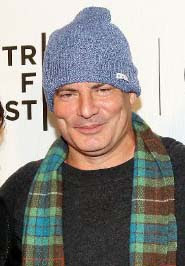As difficult as it can be to deal with leaving the closet as a young man or woman, almost anything we've seen in this regard utterly pales by comparison to what happens -- the events and subsequent trauma -- to our two heroines of TWO OF US, the French film submitted this year for "Oscar" consideration as Best International Film and which, just today, has been nominated in the Best Motion Picture--Foreign Language category for this year's Golden Globe Award.
As directed (and co-written with Malysone Bovarasmy and Florence Vignon) by Filippo Meneghetti, shown at right, the film is part cautionary tale, part black comedy, part blackmail thriller, mostly love story and absolutely all melodrama -- grounded via its two fine leading performances by popular German actress, Fassbinder favorite Barbara Sukowa (as Nina, above and below, right) and Martine Chevallier of France's famed Comédie Française (as Madeleine, at left, above and below).
Early on we get a strange and lovely impressionistic dream sequence of these two women in childhood which shows us how very close they were (or at least might have been). Otherwise, there's no real history here, yet it is clear from their proximity -- they're neighbors who spend their days and their nights together -- that these two are about as connected to one another as two people can be.
The sale of Madeleine's apartment, a move to Rome, the need to explain to family members (which of course means coming of their closet), betrayal, major health issues, followed by that aforementioned blackmail follow hot upon the heels of each previous "event" until it may be a bit difficult from some in the audience to repress a snicker, if not an outright guffaw.
And yet so grounded and utterly committed are the two leading actresses (quite typical of their entire oeuvre) that we tail along obediently, if not always that happily. Two of Us works best as love story/cautionary tale. How this particular closet can become hell on earth for both parties involved -- even if Nina would have happily come clean about the couple's sexuality long ago -- is convincingly, if heavy-handedly, presented. And thanks to the melodrama and the performances, the movie does hold your attention.
Subsidiary characters such as Madeleine's daughter (played by Léa Drucker, seated, above, and below with Chevallier), son, caregiver and even the caregiver's son are all paper-thin, existing merely to move the plot machinations ever onward.
Eventually the behavior on view become faintly absurd and then full-out ridiculous. But, hey, this is all the result of secrets and lies, and of course that closet -- particularly when one is part of a family that appears to believe: Better dead than lesbian.
So there's coincidence aplenty, a breathless escape, a last-minute change of heart, and those two grand performances. TrustMovies' take on Two of Us is that the film's heart is definitely in the right place, even if its mind -- as has that of one of its heroine's -- seems to have gone into stroke mode. Really? This is the movie the French cultural establishment imagined might win the Oscar?
From Magnolia Pictures, in French with English subtitles, and running an acceptable 96 minutes, the movie opens this Friday, February 5, and will be available digitally pretty much everywhere, it seems. Click here to learn where and how you can view it at home, and here, should you simply want more information.









































